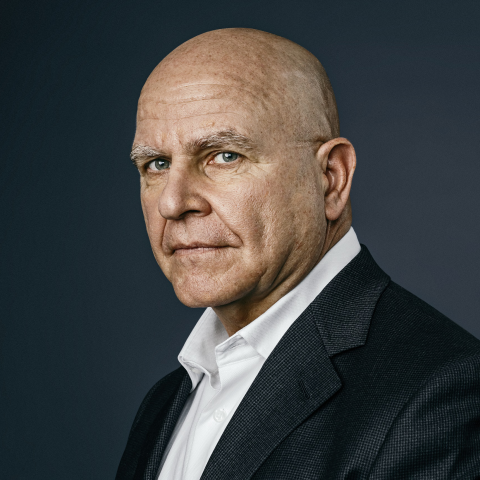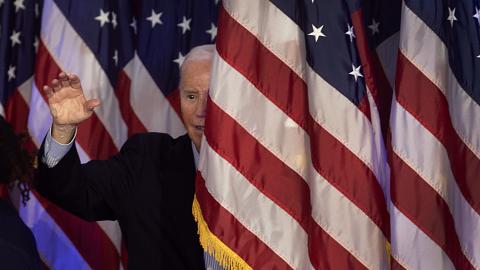On August 21, Rachel Goldberg-Polin and Jon Polin went to the Democratic National Convention to beg for their son Hersh’s life. A week later, Hamas terrorists shot and killed him in an underground tunnel in Gaza, where he had been held hostage for 11 months. President Joe Biden’s response was a letter of condolence.
That’s as strong an example as any of why rivals, adversaries, and enemies perceive Washington as weak, feckless, and unwilling to respond to grave and increasing threats facing America and our allies. It is likely that the president’s diminished capacity, no longer hidden by his White House staff, combined with the pattern of tepid responses to egregious acts of aggression, will lead to more aggression and greater danger to America’s security.
I do not carry water for any candidate for president. I served as an officer in the United States Army for 34 years and was studiously nonpartisan: I chose to follow General George C. Marshall’s example and never voted while I was on active duty.
In 2017 and 2018, I was former president Donald Trump’s national security adviser. He was a flawed commander in chief—mercurial, inconsistent, and easily distracted. He proved susceptible to manipulation by foreign leaders, influence peddlers, and some members of the administration who viewed me and others as impediments to their agendas because we tried to preserve Trump’s independence of judgment. Donald Trump and I grew apart and, after thirteen months, it was clear to both of us that I was used up.
But in the months before he fired me, I saw how Donald Trump’s experience and personality traits were a double-edged sword. They disposed him toward disruptive changes to previous unwise policies—especially in the realm of foreign policy. It is hard to imagine another president bucking conventional wisdom to pursue what became the Abraham Accords or taking on the bureaucracy to move the U.S. embassy in Israel to Jerusalem or cut off aid to corrupt international organizations like the United Nations Relief and Works Agency for Palestine Refugees in the Near East.
Unfortunately, his disruptive nature also rendered him, at times, unable to stick with some of his best decisions. For example, by early 2020 he had reversed the South Asia strategy that he had announced in August 2017, resurrecting the fundamental flaws of the Obama policy of 2009–2016 such as giving the Taliban a timeline for U.S. withdrawal and indulging the delusion that the Taliban had moderated itself. Trump, like Obama, asked Pakistani leaders to help broker peace even as they perpetrated violence and invited the virulently anti-American prime minister, Imran Khan, to sit next to him in the Oval Office. Then, he even invited the Taliban to visit Camp David on the anniversary of 9/11 before canceling the visit at the eleventh hour.
But no matter what they thought of Trump, America’s allies and our enemies did not view the 45th president as weak. He was erratic, but his course reversals created a sense of unpredictability that can be helpful, even unintentionally, in deterring our adversaries.
Unlike Trump, the Biden administration has gone to great lengths to be predictable. But our enemies have perceived this White House as reliably weak.
The perception of weakness comes, in part, from Biden’s bias toward “containment,” “de-escalation” and the wrongheaded assumption that war and violence is based on “miscalculation” rather than aggression.
Early in his administration, the president and senior officials were at pains to define America’s “redlines” in their meetings with the leaders of Russia and China. After a summit with Putin in June 2021, President Biden reported that “the tone of the entire meeting was good, positive” as he laid out “some basic rules of the road that we can all abide.” But the reported “redlines” communicated in that Geneva meeting—such as a Russian attack on major U.S. infrastructure—seem to have been interpreted by Putin as a green light for everything else, including the invasion of Ukraine in February 2022.
Last month, U.S. National Security Adviser Jake Sullivan and Chinese Foreign Minister Wang Yi met outside Beijing to “maintain channels of communication and responsibly manage the relationship between the United States and the People’s Republic of China.” The White House’s readout emphasized America’s “commitment to defending its Indo-Pacific allies” and its “concern about the PRC’s destabilizing actions against lawful Philippine maritime operations in the South China Sea.” Three days later Chinese forces surrounded and rammed the flagship of the Philippine Coast Guard in what was the seventh act of Chinese aggression against the U.S. treaty ally in the month of August alone. The Biden administration responded with a sternly worded statement from a State Department spokesman.
Even worse, the theocratic dictatorship in Iran has viewed the Biden administration attempts to resurrect the Obama policy of conciliation (through the release of frozen assets and the failure to enforce sanctions) as a way to fill its coffers, intensify its proxy wars in the Middle East, and make headway toward its twin goals of expelling the United States from the region and annihilating Israel. The calls from Washington for de-escalation of the conflicts Tehran is fomenting sound to Supreme Leader Ayatollah Khamenei like license to escalate on his own terms.
Meanwhile, the president’s tragic but undeniable cognitive decline means that America’s enemies are especially emboldened in the coming months. The danger will be greatest now–during the 57 days before the election—and then in the period between the election and the inauguration of the 47th president.
The combination of the White House’s obsession with de-escalation and the president’s mental state means that our enemies and adversaries are emboldened in their common mission: Tear down the existing U.S.-led international order. Indeed, Supreme Allied Commander Europe General Christopher Cavoli warned in April that the four members of an axis of aggressors—China, Russia, Iran, and North Korea—are “more cohesive and dangerous than any threat the United States has faced in decades.”
We have a sense of how Trump will respond to Iranian aggression. He frequently told me “everywhere I see problems [in the Middle East] there is Iran.” He knows what the return address is for the violence not only against Israel but also in Syria, Iraq, and Yemen. He is certain to ramp up sanctions enforcement against Tehran to limit the resources available for Iran’s proxy militias and terrorist organizations.
His potential response to Russia is less clear. Trump was first to provide Ukraine with defensive capabilities in December 2017, but his statements about ending the war in Ukraine in one day and reluctance to sustain military assistance to Ukraine are causes for deep concern, as is his persistent yearning for an entente with Putin.
To counter Chinese economic aggression, he is certain to expand the use of tariffs and tools of economic statecraft such as export controls and outbound investment screening, which would demonstrate a degree of continuity with the Biden administration. He is likely to bolster military support for treaty allies Japan and the Philippines, in part because both allies have dramatically increased defense spending. So has Taiwan, but Trump’s ambiguous rhetoric including complaints about Taiwan stealing the U.S. computer chip manufacturing industry and statements like “Taiwan should pay us for defense,” because “you know, we’re no different than an insurance company” could encourage Chinese aggression.
We also need to ask, of course, what will President Kamala Harris do? How would she handle things?
Harris has given a single interview and has no policy page on her website, but for a window into the policies of a potential Harris administration we can look to those who advise her on foreign affairs and national security. As Jay Solomon has written in these pages, Phil Gordon—one of the architects of the 2015 Iran deal—is one of her key advisers. That, among other rumored potential hires, indicates a likely continuation of the Obama-era Democratic disposition to conciliate dictators in the Middle East such as Ayatollah Khamenei and be tough on U.S. allies such as Israel.
As far as her record as vice president, Harris has said that she was the “last one in the room” with President Biden as they executed their botched withdrawal from Afghanistan, which claimed the lives of 13 U.S. service members and 170 Afghans, and handed Bagram Airfield over to the Taliban. It was nothing short of a disaster.
But because Harris has said so little about her policy positions, she has an opportunity to acknowledge the growing danger from the axis of aggressors, recognize that the perception of weakness is provocative, and break with the Biden administration approaches of escalation management and conciliatory approach to adversaries. But it is hard to imagine that Harris will outline an approach to foreign policy substantially different from the Democratic-establishment consensus.
Hard to imagine because, to choose just one example, when Michigan Public Radio asked Tim Walz in an interview last week about Israel’s war against Hamas, he answered:
“Well, I think first and foremost, what we saw on October 7 was a horrific act of violence against the people of Israel. They have certainly, and the vice president said it, I’ve said it, have the right to defend themselves, and the United States will always stand by that. But we can’t allow what’s happened in Gaza to happen. The Palestinian people have every right to life and liberty themselves. We need to continue, I think, to put the leverage on to make sure we move towards a two-state solution. I think we’re at a critical point right now. We need the Netanyahu government to start moving in that direction. But I think those folks who are speaking out loudly in Michigan are speaking out for all the right reasons.”
Where is the condemnation of Hamas? If there is to be any hope for enduring peace between Israel and the Palestinians, the destruction of an organization determined to destroy Israel and kill all the Jews should be regarded as a precondition. Why was all of Walz’s criticism reserved for our ally? And the idea that people calling for intifada on the streets of Michigan are “speaking out for all the right reasons” is ludicrous.
It would be good for Vice President Harris to clarify her position on this, as with so much else.
Regardless of the outcome of the election, the period of maximum danger may be the days between November 5, 2024 and January 20, 2025. Our enemies will see a President Biden who lacks the mental sharpness and energy to confront aggression. President Harris or Trump will confront a world in crisis.
Alas, I also suspect that crises will extend to the homefront. It’s not hard to imagine one candidate winning a narrow victory and the loser claiming that the result was fraudulent or skewed by foreign interference.
So what can we do? Support whoever is elected. Urge him or her to strengthen our nation, abandon the obsession with de-escalation, and convince the axis of aggressors that they can no longer pursue their objectives with impunity.
Never have I been more concerned about the fate of my nation—and of the free world.
Enjoyed this article? Subscribe to Hudson’s newsletters to stay up to date with our latest content.



















